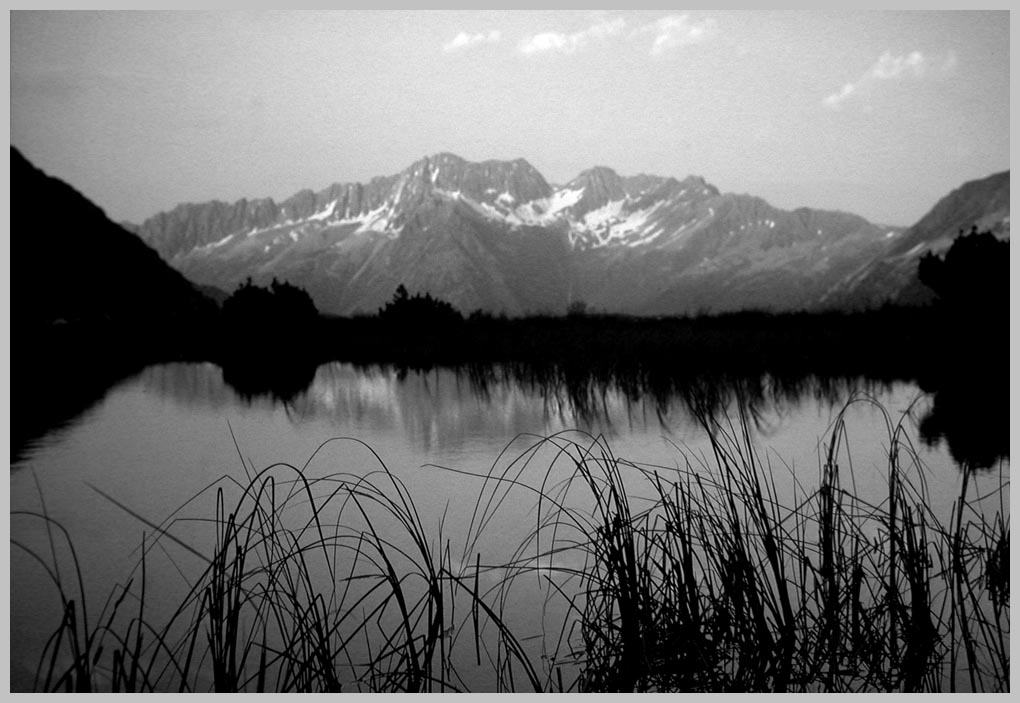

"EYE OF THE MOOR," a tarn at 1900 m. URNERLAND, the Alps [ click photo for next . . . ]


"EYE OF THE MOOR," a tarn at 1900 m. URNERLAND, the Alps [ click photo for next . . . ]
Looking to the East, over this small tarn in the center
of the German-speaking Alps, it seems so self-evident that it
hardly needs saying, that the land, and the love of the land,
are both the source and the beginning of all poetry. And yet,
the Alps are still awaiting the new sound of a poetry that seems
to fit the spirit of our time -- one of a revolution of consciousness,
perhaps -- as well as our new-found relationship with the living
Earth herself.
Rilke can perhaps help us here.
The uncollected masterpiece offered below is in every regard,
I think, remarkable. Let me just mention here the magical way --
as if tapping with a sorcerer's wand -- each image folds into
the next. This is Rilke, the most disciplined of composers,
stepping briefly out of his usual sonnet form, which was, it
might be said, both midwife to his creativity, and yet at other
times we sense as listeners, a kind of straight-jacket. But here,
we breathe a lighter, alpine air... moving from the open steppe
landscape of Spain, perhaps, to an intimate evening side-street
in Paris, sensing the presence of a beloved, always so close,
yet always so far away, like a wild and wonderful mountain
horizon that forever eludes us, as we come near....
—On the road in the European Alps.
[ You, beloved, who were lost
before the beginning ]—a poem from
the German, by Rainer Maria Rilke
You, beloved, who were lost
before the very beginning, who never came,
I do not know which sounds might be precious to you.
No longer do I try to recognize you, when, as a surging wave,
something is about to manifest. All the huge
images in me, the deeply-sensed, far-away landscapes,
cities and towers and bridges and un-
suspected turns of the path,
the powerful life of lands
once filled with the presence of gods:
all rise with you to find clear meaning in me,
your, forever, elusive one.You, who are all
the gardens I've ever looked upon,
full of promise. An open window
in a country house—, and you almost stepped
towards me, thoughtfully. Alleyways I happened upon,—
you had just passed through them,
and sometimes, in a small shop, the mirrors
were still dizzy with you and gave back, frightened,
my too sudden form.—Who is to say if the same
bird did not resound through us both
yesterday, separate, in the evening?
Rainer Maria Rilke (tr. Cliff Crego)
(Paris, winter of 1913 - 14)
[ Du im Voraus verlorne Geliebte . . . ]
Du im Voraus
verlorne Geliebte, Nimmergekommene,
nicht weiß ich, welche Töne dir lieb sind.
Nicht mehr versuch ich, dich, wenn das Kommende wogt,
zu erkennen. Alle die großen
Bildern in mir, im Fernen erfahrene Landschaft,
Städte und Türme und Brücken und un-
vermutete Wendung der Wege
und das Gewaltige jener von Göttern
einst durchwachsenen Länder:
steigt zur Bedeutung in mir
deiner, Entgehende, an.Ach, die Gärten bist du,
ach, ich sah sie mit solcher
Hoffnung. Ein offenes Fenster
im Landhaus—, und du tratest beinahe
mir nachdenklich heran. Gassen fand ich,—
du warst sie gerade gegangen,
und die spiegel manchmal der Läden der Händler
waren noch schwindlich von dir und gaben erschrocken
mein zu plötzliches Bild.—Wer weiß, ob derselbe
Vogel nicht hinklang durch uns
gestern, einzeln, im Abend?
order RILKE IN THE WALLOWAS
for $49.95 + shipping or
download as e-Book for $14.95
New English translations
from the German of 80
of Rainer Maria Rilke's
best poems, together
with 120 color prints
from the High Wallowas.
With introduction . . .
|
| preview opens in new window |
| about RILKE IN THE WALLOWAS |
All Photographs & texts by Cliff Crego © 1999-2015 picture-poems.com
(created: X.14.2007)